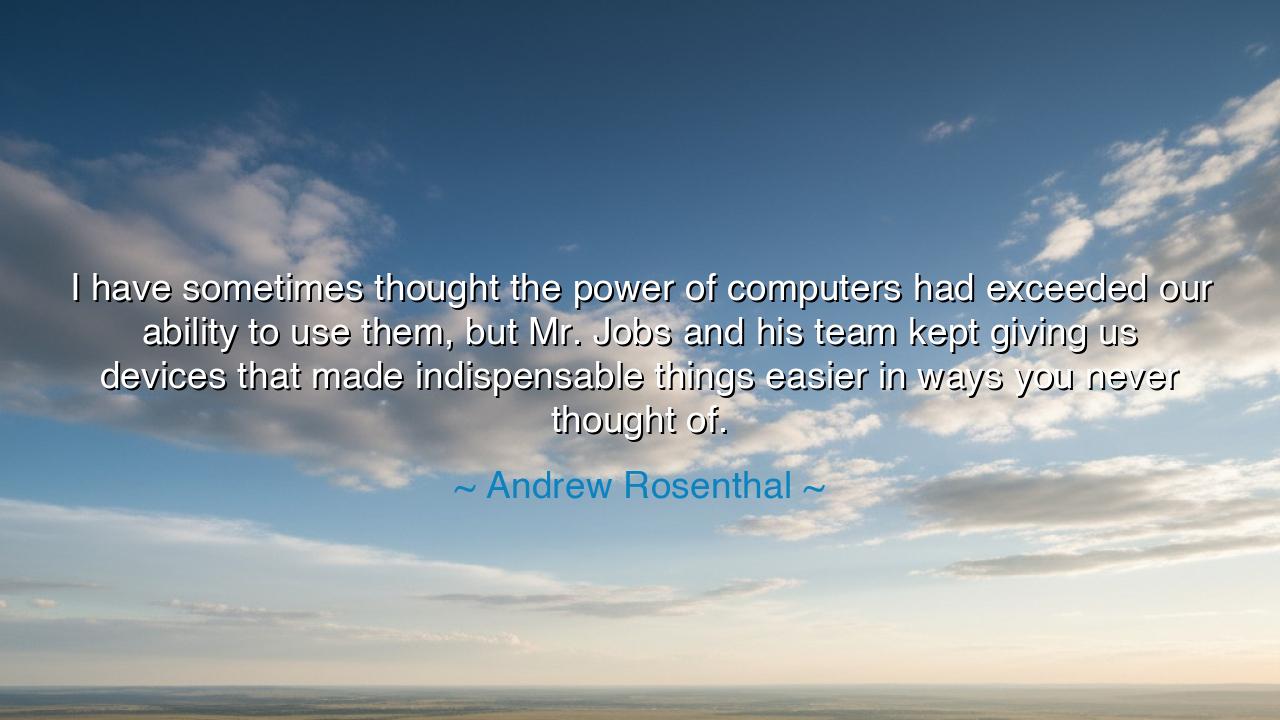
I have sometimes thought the power of computers had exceeded our
I have sometimes thought the power of computers had exceeded our ability to use them, but Mr. Jobs and his team kept giving us devices that made indispensable things easier in ways you never thought of.






The thoughtful observer Andrew Rosenthal, a man who bore witness to the digital revolution, once reflected: “I have sometimes thought the power of computers had exceeded our ability to use them, but Mr. Jobs and his team kept giving us devices that made indispensable things easier in ways you never thought of.” In these words lies not only a tribute to Steve Jobs and his vision, but a profound meditation on the nature of innovation itself—the eternal dance between the power of invention and the wisdom to wield it. Rosenthal’s statement speaks to a truth as old as civilization: that human beings often create tools greater than their understanding, and only through vision, artistry, and purpose can those tools be transformed from chaos into beauty.
In the ancient world, when fire was first harnessed, it brought both creation and destruction. It could warm the hearth or consume the village. When Daedalus built wings of wax and feather, he gave humanity the dream of flight—but his son Icarus, intoxicated by that power, flew too close to the sun. So it has always been: the tools of humankind are double-edged, and their true value lies not in their strength but in the wisdom with which they are used. Rosenthal speaks to this timeless struggle when he admits that computers, magnificent in power, once seemed to surpass our ability to understand or control them. The digital age, like fire in the hands of early man, offered infinite potential—and infinite peril.
But then came Steve Jobs, whom Rosenthal honors not merely as a maker of devices, but as a tamer of complexity. Jobs’ genius was not in adding more power, but in revealing the soul within the machine. He saw what others could not—that technology must serve the spirit, not enslave it. His creations—the Macintosh, the iPhone, the iPad—were not simply tools of calculation, but instruments of expression. Where others built computers as fortresses of logic, Jobs built them as bridges to the imagination. He turned the cold hum of circuitry into something human, something that felt like an extension of thought and emotion. In this, he became not just an inventor, but a kind of modern Prometheus, bringing light to a world too long shadowed by complexity.
To say that computers had exceeded our ability to use them is to admit that humanity had, for a time, lost its way. In the rush for progress, the world had built machines without meaning, power without poetry. Jobs, however, understood that the true revolution was not in hardware, but in design, simplicity, and experience. Like the sculptors of old who chiseled stone to reveal the divine within, he stripped away complication until only clarity remained. He and his team gave the world devices that turned the incomprehensible into the intuitive—tools that allowed the artist to paint, the child to learn, the worker to dream. As Rosenthal says, they made “indispensable things easier in ways you never thought of.”
Consider, for example, the creation of the iPhone. Before its birth, the world staggered beneath a labyrinth of buttons and screens, each demanding to be mastered. Jobs’ team saw beyond this confusion and imagined a device with a single, glowing surface—a window to all human creativity. In doing so, they transformed not only technology, but life itself. The same spirit that once guided the builders of the Library of Alexandria—the desire to bring knowledge into the hands of all—was reborn in this small, elegant instrument. The iPhone, like the printing press before it, democratized information and gave humanity new power to communicate, learn, and create.
Rosenthal’s admiration, then, is more than praise—it is recognition of a greater truth: that innovation is not merely the act of building new things, but of revealing new meanings. To wield power wisely is to align invention with human need. Just as the philosopher Socrates turned the chaos of thought into the discipline of dialogue, Jobs turned the chaos of technology into the clarity of connection. And so, the seemingly infinite complexity of the modern age became once more an extension of the mind, rather than a burden upon it.
The lesson here, O listener, is both humbling and inspiring. As humanity strides deeper into the realm of machines—into the domains of artificial intelligence, automation, and digital creation—we must remember what Rosenthal saw so clearly: that the value of our inventions depends on the wisdom of our hearts. We must not create for power’s sake, but for purpose’s. We must seek to make what is complex simple, what is cold compassionate, and what is mechanical meaningful. For only when we unite technology with humanity do we become truly creative, truly free.
Thus, let Andrew Rosenthal’s reflection stand as both a tribute and a warning: the tools we build can exceed us, or they can elevate us. The difference lies in whether we build them with arrogance or with empathy. Let us be like Jobs—not content to invent, but determined to humanize. Let us create things that do not overwhelm the mind, but inspire the soul. For in every age, from fire to silicon, the wisest builders are those who remember that power without understanding is peril—but power joined with vision becomes art, and through art, humanity endures.






AAdministratorAdministrator
Welcome, honored guests. Please leave a comment, we will respond soon